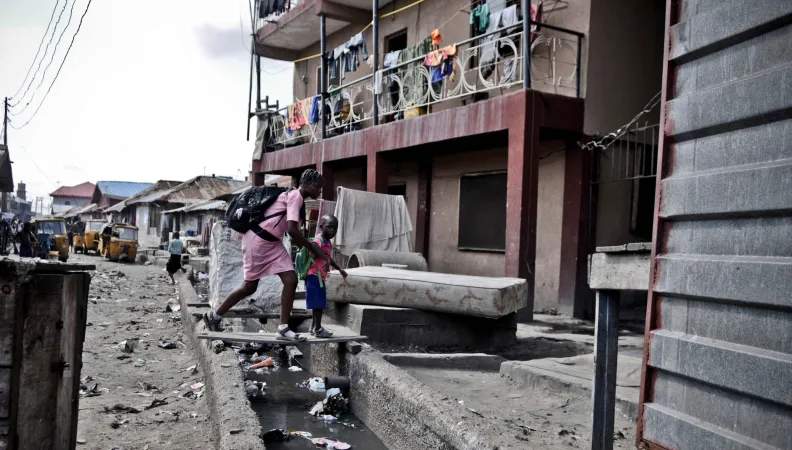 AFD and the Economic Research Forum (ERF), in collaboration with the Egyptian Central Agency for Public Mobilization and Statistics (CAPMAS), are supporting the implementation of the fifth wave of the Egypt Labor Market Panel Survey (ELMPS). This new wave of the ELMPS survey aims to highlight the evolution of the Egyptian labour market, economy and society and thus provide essential data to analyze the effects of public policies in Egypt.
AFD and the Economic Research Forum (ERF), in collaboration with the Egyptian Central Agency for Public Mobilization and Statistics (CAPMAS), are supporting the implementation of the fifth wave of the Egypt Labor Market Panel Survey (ELMPS). This new wave of the ELMPS survey aims to highlight the evolution of the Egyptian labour market, economy and society and thus provide essential data to analyze the effects of public policies in Egypt.
Context
Labour market panel surveys (LMPS) are household surveys that allow to observe the evolution of labour market dynamics by following the same individuals over several years. Conducted in Egypt in 1998, 2006, 2012 and 2018, these surveys have become the focus of research on the labour market, human development, migration, the (de)composition of families and social protection. They make it possible to analyse the impacts of the various tax and monetary reforms undertaken in the country. The data also sheds light on the opportunities and challenges women face in the labour market.
Goal
This research partnership supports the implementation of the fifth wave of the ELMPS survey in Egypt by providing co-financing dedicated to data collection and dissemination. The objective of this collaboration is to support the production of the wave, as well as presentation chapters of this wave, four of which will be published as research papers to deepen knowledge on the Egyptian labour market. Particular attention will be paid to the analysis of the labour market situation in Egypt following the Covid-19 pandemic, thus providing relevant insights in this post-pandemic context.
Method
The new ELMPS 2023 wave is largely based on the questionnaire of the 2018 ELMPS survey, which addressed issues such as demography, employment, income, migration and well-being.
This edition differs from previous editions in several ways:
- It incorporates questions dedicated to assessing the impact of the Covid-19 pandemic;
- It broadens its coverage by including new components, such as the digital economy (gig economy) and employment measurement in the emerging green and circular economy sectors;
- It provides for a skills-based module, with the inclusion of a wider variety of skills, which will assess the extent to which workers' skills match the needs of the labour market.
These improvements are intended to ensure more comprehensive and representative data, thus providing a solid foundation for informed public policy development.
Results
The ELMPS 2023 database will be made available on the ERF website.
Research papers will focus specifically on:
- The role of internal migration in territorial dynamics;
- The evolution of the insurance system and its coverage;
- Technology in the labour market and its use;
- The green economy and the labour market.
A book will be published covering the themes of 1) labour supply; 2) employment structure; 3) inequalities; 4) mismatch between labour supply and demand; 5) gender and occupational segregation; 6) international migration; 7) social protection; 8) technology in the workplace; 9) green economy; 10) small and medium-sized enterprises (SMEs); 11) care activities (paid and unpaid); 12) food security and resilience to shocks.
Contacts:
- Dr. Cecilia Poggi, Research Officer, AFD
- Prof. Ragui Assaad, Humphrey School of Public Affairs, University of Minnesota
 Legal notice EU (project) Through which channels did the Covid-19 pandemic impact inequalities in Togo? What have been the effects of the “Novissi” cash transfer program implemented by the Togolese government on the mitigation of income inequality? The EU-AFD Research Facility on Inequalities will seek to answer these questions in collaboration with the University of Lomé.
Legal notice EU (project) Through which channels did the Covid-19 pandemic impact inequalities in Togo? What have been the effects of the “Novissi” cash transfer program implemented by the Togolese government on the mitigation of income inequality? The EU-AFD Research Facility on Inequalities will seek to answer these questions in collaboration with the University of Lomé.
Context
Research has already shown that some population groups have been harder hit by Covid-19 than others and that the pandemic exacerbated existing inequalities in many areas, including health, education, work, and gender.
In this context, inequality has become a central issue for governments willing to fight the effects of the pandemic and to better prepare for future shocks. In April 2020, the Togolese government set up a cash transfer program called "Novissi", with the financial contribution of AFD, to support any eligible Togolese citizen who lost his or her income due to the adoption of the response measures against Covid-19.
This project is part of the call for research proposals “Advancing the inequality agenda through collaborative research: identifying the priorities for a global Team Europe approach on inequalities”, launched by the Strategic Committee of the Research Facility on Inequalities. It is coordinated by AFD and co-financed by the European Commission, AECID and ENABEL.
Goal
Studies using updated data and capturing the potential effects of the Covid-19 pandemic on income inequality and poverty in Togo are relatively scarce.
This research project aims to fill the gap in academic literature by:
- Analyzing the impacts of Covid-19 on inequality in Togo;
- Evaluating the effects of the Togolese social policy « Novissi » on mitigating the impact of Covid-19 on inequality.
Method
Using rich microeconomic data from a survey conducted by Togo's Institut National de la Statistique et des Études Économiques et Démographiques (INSEED) aimed at analysing the impact of the Covid-19 pandemic, the research team will estimate an econometric model based on the model developed by Dang and Nguyen (2021).
Results
You will find below the different research papers related to this project:
In progress
Contact:
- Anda David, Research Officer, AFD
